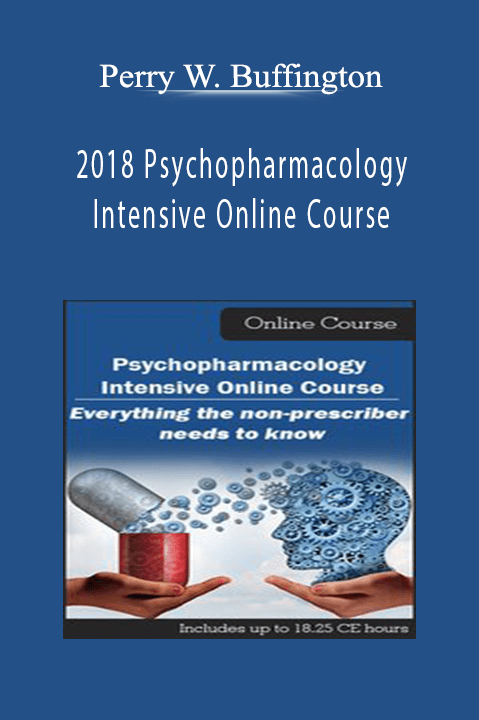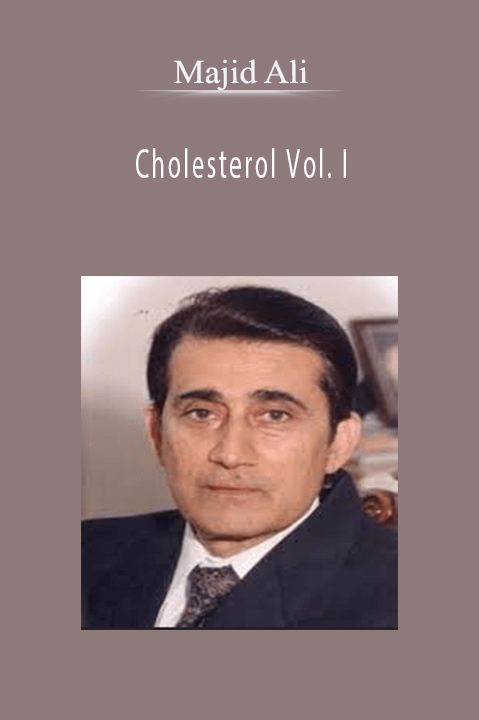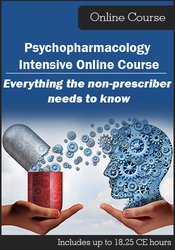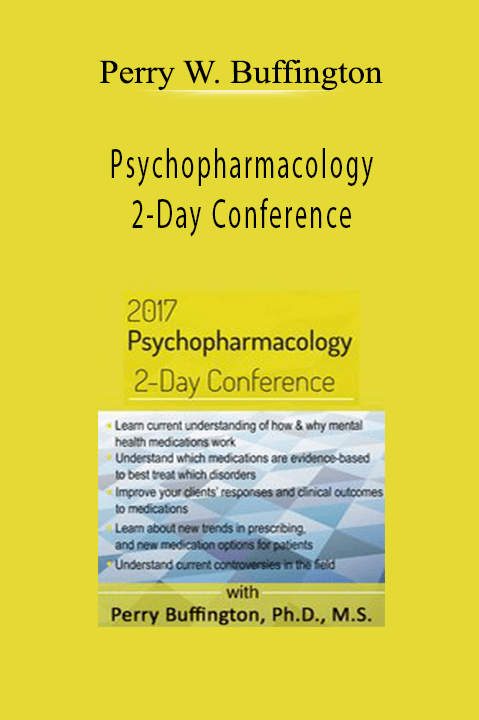2018 Psychopharmacology Intensive Online Course: Everything the Non-Prescriber Needs to Know – Perry W. Buffington
With the number of prescriptions written yearly on the rise, it’s more critical than ever for mental health professionals to understand how psychotropic medications work, where in the body they work, and why they do (or don’t) improve your clients’ therapeutic outcomes.
Are you confident in your role as both the patient advocate and protector to effectively address medication assisted treatments in your overall care plan?
Based on 20+ years of experience in the medical-consulting field, expert instructor Perry Buffington, Ph.D., M.S., will guide you through the newest advances and contemporary trends in blending medication management with psychotherapy interventions for ADHD, depression, anxiety, psychotic disorders, substance abuse and more.
Together, you’ll explore medical drug emergencies, how nutrition and herbal supplements impact medication effectiveness, and the psychopharmacological ethics you need to know to best protect your clients. You’ll also learn specialized guidelines for geriatrics, pregnant or nursing women, and clients with chronic pain.
Designed for counselors, nurses, psychotherapists, psychologists and other mental health professionals, this comprehensive online course will walk you step-by-step through the science of psychopharmacology in a non-threatening, non-complicated way.
Don’t wait to get the knowledge you need to know to answer your clients’ questions, manage side effects, understand medication reactions and improve your treatment outcomes.
Get the up-to-date medication information you need to improve your treatment outcomes.
Through three comprehensive video modules, Dr. Perry Buffington will show you the latest advances in psychopharmacology and contemporary trends in medication management. In addition to a foundational review of medications, you will examine case examples, discuss medication controversies and learn how to effectively collaborate with prescribing practitioners.
Dr. Buffington’s years of work in mental health combined with his engaging presentation style, make this complex topic understandable, applicable and useful. With an emphasis on the experience and safety of the client, you’ll get the step-by-step guidance you need to comfortably, confidently and safely help your clients using medication.
Module 1:
The Foundation of Psychopharmacology & Treatment of Depressive Disorders
In Module One, Dr. Buffington will begin with the basic knowledge of psychopharmacology that all non-prescribing providers need to know.
Together, you’ll review the many options your clients have for both medication and/or psychotherapy. You’ll also start exploring how drugs work, where in the body they work, and why they work (or don’t work!). Leave this module with a mastery of the foundational skills you need to better protect your patients using medication.
Foundational Knowledge
- The 9 rules of psychopharmacology
- Drug metabolism concepts: pharmacokinetics & pharmacodynamics
- Mechanism of action of today’s psychotropic medications: How, where and why medications work
- Placebo & nocebo
- Understanding receptors and how to prescribe based on their action
Masking: Psychological Problems Disguising Medical Disorders
- Differential disorders & diagnostic workup
- Top 10 life threatening side effects
Depressive Disorders
- The terminal button & neuronal health
- Biogenic amine, cortisol, down-regulation, & neurotropic hypotheses
- Treatment resistant depression and drug combinations
Module 2:
Treating Anxiety, Trauma, and Other Mental Health Disorders
In this session, you’ll take a deep dive into the neurochemistry and medication management strategies of specific disorders.
Dr. Buffington will also explore side effects, including where unusual and common side effects come from, so you can ease their impact and help your clients achieve optimal results from their medication care plan.
Psychotic Disorders/Schizophrenia
- Extrapyramidal symptoms and TD
- Hyperprolactinemia: Why you need to know it
- Use of atypical antipsychotics for multiple disorders
- Pregnancy and psychotic disorders
- Movement disorders: Tardive Dyskinesias, Dystonias, Akathisia, EPS
Sleep Disorders
- REM sleep and neurotransmitters
- Hypnotics/Sedatives
- FDA-approved treatments for insomnia
Bipolar Disorders
- Mood stabilizers and lithium
- Anticonvulsants & neuromodulators
Eating Disorders
- “Stacker Diet Pills”
- Laxatives and diuretics
- Impact of medication on treatment outcomes
Anxiety, OCD and Trauma Related Disorders
- Physiological interventions
- Non-pharmacologic options
- Benzodiazepines: risks and benefits
Nutritional Psychopharmacology
- Monoaminergic rich foods
- Achetylcholinergic rich foods
- Anti-inflammatory foods
Module 3:
Working with Special Cases and Understanding Ethics
In the final module, you’ll learn how to distinguish the unique medication considerations for special populations. You’ll also learn to differentiate between acute vs. chronic pain and the ethical issues surrounding the everyday practice of clinical psychopharmacology.
You’ll leave this module confident in your ability to effectively address medication assisted treatments into your overall care plan with an understanding of your role as both the patient advocate and protector.
Attentional Disorder
- Differential diagnosis
- Treatment controversies
- Substance abuse and ADHD
- Stimulant vs. non-stimulant options
Substance Abuse Disorders
- Negative reinforcement & creation of habits
- PCP, MDMA (ecstasy) & ketamine
- Energy vs. chill drinks
- Over-the-counter & herbal psychopharmacology
Treating Client Pain
- Acute vs. chronic pain
- Alternatives to psychopharmacology
- Pain vs. depression: which comes first?
- Co-morbid pain alternatives
Special Populations
- Specialized guidelines for geriatric patients
- Dementia treatment
- Pregnancy guidelines
- Slow vs. rapid metabolizers (genetic polymorphisms)
Ethics and Psychopharmacology
- High-risk pharmacology & psychopharmacology
- Off-label use of medications
- Prescribing for children
- Marketing of mental illness
- Informed vs. uninformed consent
- Patient & third party pressures
- Ethics associated with medical errors
Get Download 2018 Psychopharmacology Intensive Online Course: Everything the Non-Prescriber Needs to Know – Perry W. Buffington at Offimc.click Now!
Delivery Information
- Upon ordering the product, a delivery email with download instructions will be sent immediately to you so that you may download your files. If you log in (or create an account) prior to purchase you will also be able to access your downloads from your account dashboard.
- It is a digital download, so please download the order items and save them to your hard drive. In case the link is broken for any reason, please contact us and we will resend the new download link to you.
- If you don't receive the download link, please don’t worry about that. We will update and notify you as soon as possible from 8:00 AM – 8:00 PM (UTC+8).
- Please Contact Us if there are any further questions or concerns you may have. We are always happy to assist!









11 reviews for Perry W. Buffington – 2018 Psychopharmacology Intensive Online Course: Everything the Non–Prescriber Needs to Know
There are no reviews yet.